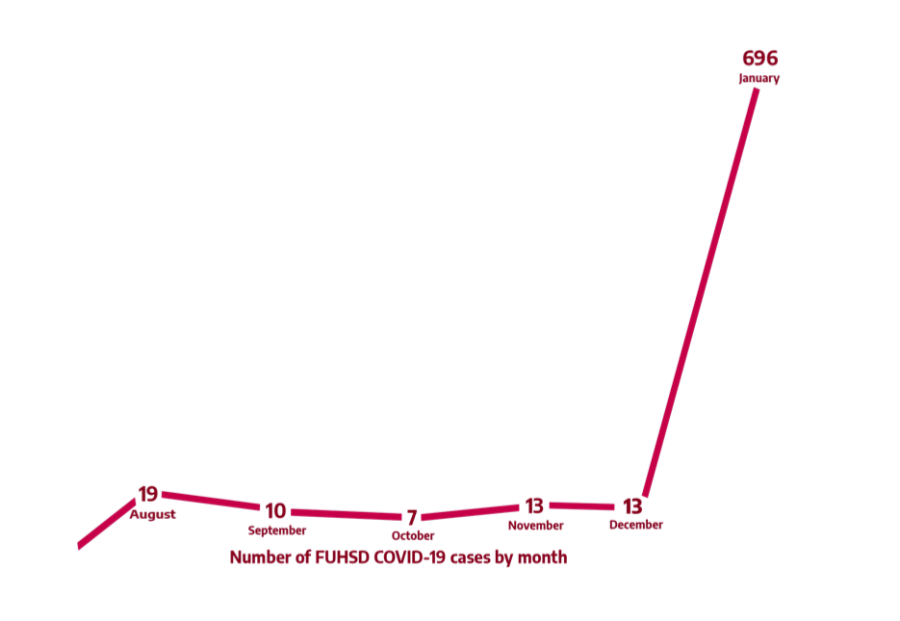101 COVID-19 cases since Jan. 3
Graphic illustration by Tanika Anbu
FUHSD COVID-19 cases have skyrocketed since the Omicron variant in January.
February 1, 2022
Since the beginning of the school year, Lynbrook has reported 108 COVID-19 cases, 101 of which occurred on and after Jan. 3. Faced with the surge in COVID-19 cases due to the Omicron variant during the holiday season, FUHSD and Lynbrook implemented guidelines such as COVID-19 testing and new masking requirements to stop the spread and keep students and staff safe.
From Jan. 3 to Jan. 7, 65 students and staff tested positive for COVID-19; out of the 52 student cases, 20 occurred before Jan. 3. During the weeks of Jan. 14 and Jan. 21, there were 17 and 19 positive cases, respectively.
While some neighboring districts have discontinued contact tracing in the second semester, Lynbrook and other FUHSD schools have kept this practice in place. Upon receiving the alert of a case, Assistant Principal and COVID-19 designee Susan Rocha determines close contacts by establishing who was within six feet of the individual for 15 minutes or more. This is done by examining seating charts of the student’s classes and asking students who they were around during lunch or sports. Due to the surge in cases in the first four days following winter break, Rocha was not able to thoroughly contact trace and instead sent close contact emails to entire classes.
“It’s very difficult to keep up with the contact tracing,” Rocha said. “It’s almost impossible. If you think about it, there have been 40 cases in the week after winter break, and every student averages five classes. That’s 200 classes we need to determine close contacts in, and that doesn’t include where they were at lunch or if they were in after-school sports.”
Since then, the increase in cases has slowed, and the normal contact tracing procedure has resumed. As of Jan. 19, the definition of a close contact has changed to an individual who has shared an indoor airspace with someone with COVID-19. Close contacts are no longer required to quarantine, regardless of vaccination status.
In anticipation of a surge in cases following winter break, FUHSD opened COVID-19 testing centers at each of the five schools on Jan. 3, set to remain in place until the end of the school year. Students and their immediate family members can take an Antigen test from 7:30 a.m. to 4:00 p.m. on Mondays at Lynbrook’s former main office and the rest of the week at the other FUHSD schools. At this time, students who are involved in basketball, wrestling and music are required to take tests every week.
“The line gets fairly long, but it’s relatively efficient inside the testing center,” said junior Harita Sunkara, who gets tested every week for basketball. “The testing center definitely helps people feel safer. On a personal level, my parents feel more comfortable sending me to practice knowing that I’m testing negative.”
On Jan. 4, teachers passed out at-home test kits provided by Santa Clara County during sixth period for students to take a COVID-19 test at home. It is unclear if Lynbrook will receive more at-home tests in the future. However, students can order up to four free at-home COVID-19 tests from the federal government online.
“The intention was to get the tests out before students went on winter break so they could test before they came back, but that did not happen,” Rocha said. “The county ran short of supplies and we didn’t get them all in time. If students tested positive, they could quarantine because the understanding of Omicron is that there are a lot more people that are asymptomatic or have really mild symptoms, so they wouldn’t even know if they were positive.”
Students also received five KN95 masks on Jan. 20. The goal is for a different mask to be worn every day and the set of masks to be reused each week. In an update from FUHSD on Jan. 14, students are encouraged to either wear a KN95 mask or double-mask with a surgical mask covered by a cloth mask.
“We are handing out masks because there is research that if you have a different mask for every day of the week, then your masks will last longer,” Principal Maria Jackson said in her Virtual Coffee & Chat on Jan. 11. “You don’t have to throw it away after each use.”
Despite the procedures implemented to limit the spread of COVID-19 at school, many students and parents are worried about the risk of transmission associated with attending school in-person. 37% of the 231 responses from the Epic’s Instagram survey preferred remote learning, citing reasons such as not feeling safe and wanting to protect the health of their loved ones.
“The COVID-19 vaccine ensures you experience less severe symptoms but doesn’t completely make you immune,” freshmen Anusha Shringi said. “Even going into remote learning would be beneficial as it could potentially help lower the spread of COVID-19 throughout Lynbrook.”
However, 63% of respondents preferred to continue going to school in-person. Students mentioned reasons such as struggling to pay attention in an online setting, wanting to physically see their friends and not wanting to miss out on school events such as rallies and prom.
“I would prefer to continue in-person school because I don’t want to miss out on second semester senior year events,” senior Aryan Dwivedi said. “COVID-19 taking away our on-campus experience, including major events like Silsilay, homecoming and powerpuff, was disappointing. So in hopes of that not happening again, I’d definitely be open to staying on campus, though I understand that health and safety is the ultimate priority.”
At this time, Lynbrook will be continuing school in-person in accordance with County Public Health and Santa Clara County Board of Education mandates.
“We, as a district, can’t make the decision to go to remote learning right now,” Jackson said. “The County Health and California Department of Education are not giving waivers for that to happen at this time, so going into remote learning without a waiver could mean an incredible loss of state funding.”
Administration encourages students to continue wearing masks and social distancing, considering vaccination and boosters and staying home if sick.
“Practice safety not only for yourself but for others too,” Rocha said. “I really think that this will get better. I know it feels overwhelming, but it won’t be like this forever.”
The school’s COVID-19 policies change rapidly. Read what the Epic thinks about these policies here.



































































